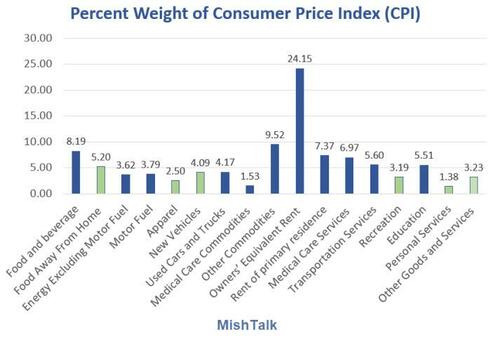What Can The Fed Do About The Price Of Food, Medicine, Gasoline, Or Rent?
Authored by Mike Shedlock via MishTalk.com,
The answer is nothing or next to nothing. Rates hikes will not impact inelastic items…
CPI Weights from BLS chart by Mish
Chart Notes
The above chart shows percentage weights in the CPI according to the latest CPI Report, Table 1, relative weights.
I believe the BLS has a subtotal error in the table. Specifically, the Shelter Less Energy Services subtotals do not add up to 57.395 (32.802+6.971+5.597=45.37). I believe the BLS is missing Education, Recreation, and other services. I plucked those from Table 2.
Items in blue are inelastic, that is demand for them will not change regardless of what the Fed does.
Items in green are elastic items. The Fed can reduce demand for them by hiking rates.
What the Fed Can and Cannot Do
The Fed cannot directly influence the price of anything because it cannot produce either goods or services.
The Fed can reduce or increase demand where demand is elastic by raising or lowering the cost of money.
Demand Destruction
I have often spoken of demand destruction by Fed rate hikes. Curiously, the primary demand destruction is not even in the tables.
Home prices are not in the CPI. Yet by hiking rates, the Fed will certainly cool the demand for housing.
With decreased demand for housing comes decreased demand for things like furniture, landscaping, carpet, etc.
By hiking rates, the Fed also reduces the demand to hold stocks. The price of equities drops. That also reduces the demand for housing, new cars, eating out, and travel.
Elastic vs Inelastic Demand
Elastic items total only 19.59%.
Inelastic items total a whopping 80.41%.
This is why inflation Expectations theory the Fed abides by is total nonsense.
People will not rent two homes if they perceive prices will rise. Nor will people stop paying rent and wait for declines in they believe prices will fall.
The same applies to buying food, gas etc.
Stupidity Well Anchored: Absurdity of Inflation Expectations in Graphic Form
I discussed the silliness of inflations expectations theory in Stupidity Well Anchored: Absurdity of Inflation Expectations in Graphic Form
CPI Percentage Weights
The idea behind inflation expectations is that if consumers think prices will go down, they will hold off purchases and the economy will collapse. The corollary is that is consumers think inflation will rise, they will rush out and buy things causing the economy to overheat.
With that backdrop, let’s have a Q&A. I believe the answers are obvious in all cases.
Inflation Expectations Q&A
Q: If consumers think the price of food will drop, will they stop eating out?
Q: If consumers think the price of food will drop, will they stop eating at home?
Q: If consumers think the price of natural gas will drop, will they stop heating their homes and stop cooking to wait for the event.
Q: If consumers think the price of gas will drop, will they stop driving or not fill up their car if it is running on empty?
Q: If consumers think the price of gas will rise, can they do anything about it other than fill up their tank more frequently?
Q: If consumers think the price of rent will drop, will they hold off renting until that happens?
Q: If consumers think the price of rent will rise, will they rent two apartments to take advantage?
I do not believe the Fed can tame rent prices. It can tame demand for new houses and demand for equities.
Those are the two largest measures of inflation. Yet, neither is in the CPI.
Too much of the CPI is inelastic for the Fed to have any impact.https://t.co/dtkN0y3aiX
— Mike “Mish” Shedlock (@MishGEA) March 20, 2022
Asset Irony
People will rush to buy stocks in a bubble if they think prices will rise. They will hold off buying stocks if they expect prices will go down.
People will buy houses to rent or fix up if they think home prices will rise. They will hold off housing speculation if they expect prices will drop.
The very things where expectations do matter are the very things the Fed ignores.
Demand destruction will occur in the small subset of elastic items plus housing and stocks.
Except as related to recreation and eating out, rate hikes will not impact food, energy, or shelter, the overwhelming majority of the CPI.
Finally, please note A Fed Economist Concludes the Widely Believed Inflations Expectations Theory is Nonsense
* * *
Tyler Durden
Mon, 03/21/2022 – 12:05

